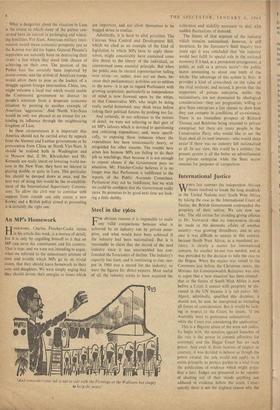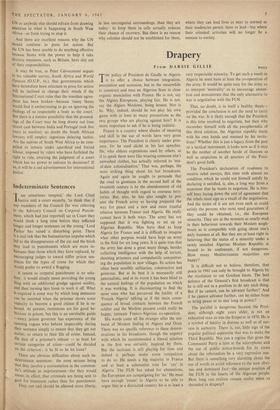International Justice
WHEN last summer the independent African States resolved to break the long deadlock in the United Nations over South West Africa by taking the case to the International Court of Justice, the British Government commended the propriety of their action. We can now see why. The old excuse for avoiding giving offence to Dr. Verwoerd—that no intervention should be made in the domestic affairs of another country—was growing threadbare; and in any case it was difficult to sustain in this context, because South West Africa, as a mandated ter- ritory, is clearly a matter for international concern. So another let-out was needed; and it was provided by the decision to take the case to the Hague. When the matter was raised in the Commons just before the Christmas recess, the Minister for Commonwealth Relations was able to argue that a 'new situation' has been created: that as the future of South West Africa is now before a Court it cannot with propriety be dis- cussed in the UN because it is sub judice. Mr. Alport, admittedly, qualified this decision; it should not, he said, be interpreted as excluding all forms of consideration. But it would be lack- ing in respect to the Court, he insists, 'if the Assembly were to pronounce substantively . . . while the Court was considering the application.'
This is a flagrant abuse of the term sub flake. To begin with, the sanction against breaches of the rule is the power to commit offenders for contempt, and the Hague Court has no such power. And even if, from motives of respect or courtesy, it was decided to behave as though the power existed, the rule would not apply, as it exists primarily to protect parties to a trial rrom the publication of evidence which might preju- dice a jury. Judges are presumed to be capable of shutting out of their minds anything not adduced in evidence before the court. Conse- quently there is not the slightest reason why the UN or anybody else should refrain from drawing attention to what is happening in South West Africa—or from trying to stop it.
And there are excellent reasons why the UN Should continue to press for action. But the UN has been unable to do anything effective because States with the power to help it take decisive measures, such as Britain, have slid out of their responsibilities.
It may be true, as Peter Calvocoressi argues in his valuable survey, South Africa and World Opinion (0.U.P., 6s.), that governments which have heretofore been reluctant to press for action Will be inclined to change their minds if the .International Court rules that the mandate agree- ment has been broken—because "many States Would find it embarrassing to go on ignoring the findings of so respectable a body as the court.' But there is a sinister possibility that the proceed- ings of the Court may be long drawn out (one recent case between India and Portugal took five Years to resolve); no doubt the South African lawyers will employ ingenious delaying tactics. Are the natives of South West Africa to be com- pelled to remain under apartheid and forced labour, imposed by rulers who have forfeited the right to rule, awaiting the judgment of a court Which has no power to enforce its decisions? If so, it will be a sad advertisement for international justice.











































 Previous page
Previous page